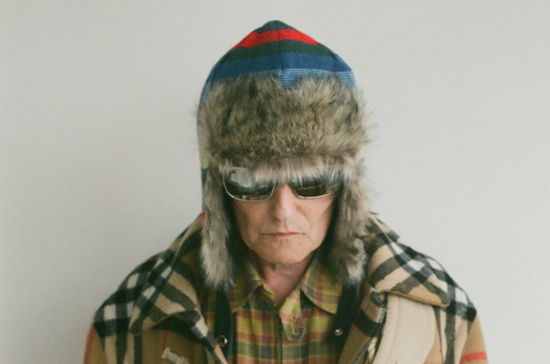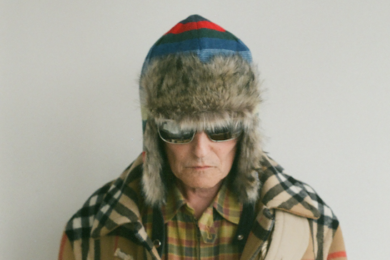Photo by Laura Ghezzi
The naming of things means something to Lawrence, patently evident from his work in Felt, Denim, Go-Kart Mozart, and more recently Mozart Estate. “A tougher name for tougher times,” he says. “I think you could have Mozart Estate on your leather jacket.” Forthcoming record Pop-up! Ker-ching! And The Possibilities Of Modern Shopping couldn’t have arrived at a more apposite time, he argues. “Seems a bit prescient doesn’t it? We are in a state of disruption all the time, but despite it all people carry on shopping, Primark is still like a big jumble sale. We shop for many reasons, when we are down, when we are excited, when we have money, don’t have money. We are a shopping society, and that’s kind of what it’s about.”
It’s a record that finds Lawrence firmly immersed in the modern world, a change from his earlier career. “In the 80s I was doing Felt and I was purposefully single-minded. I shut myself into a tunnel that was only music. I wasn’t interested in what was going on around me really, I tried to construct my own little world so that I could concentrate on getting lots of records out. I was different to a lot of other musicians who were very angry about what was going on. I haven’t got an overarching sense of why I am commenting on this consumerist society now, I think mainly it’s that I want to be relevant.”
Some songs on the record have sobering titles like ‘Relative Poverty’, but a sound that’s surprisingly upbeat, a duality that is not lost on Lawrence. “That one is about a letter I got once when I was assessed. There are three kinds of poverty apparently, and I was in ‘relative poverty’. That phrase stuck out to me, and I thought it was a great idea for a song. I didn’t have any money for a long time, so I was focused on what was going on around me more than I used to be. I wanted something that could be in the charts, but also have an important message delivered in a humorous or stark way – I just wanted to write a song I hadn’t heard myself.”
The absurdity of life is a theme of Lawrence’s work, something he often addresses with wry humour. In this aspect of his work he often draws on literature. “Books have really touched me in that way, as they are almost a guide to living. Louis-Ferdinand Céline, the French writer, and his two books Journey To The End Of The Night and Death On Credit had a profound effect. And then Hunger by Knut Hamsun, the Norwegian writer; if you want to understand me, read that. He talks about wanting to be an artist, and his struggles to become an artist. He knows that if he gets a job all his problems will be solved, but he can’t because he’s an artist, so he suffers for his art. It’s very funny and very true.”
The noisier the world gets, the harder it can seem to be heard, but Lawrence’s solution is to not give in. “I am not sure if there is anyone who does the liner notes like I have on the last three albums, where you’re getting a whole world, what I call the West Midlands world,” he argues. For this self-penned universe, he says, I get my inspiration going to shopping centres, and day to day living. I’m not online, I don’t have a computer or smartphone, so although I don’t like the ordinary world as it’s boring and mundane, I immerse myself in it constantly, because I live on my own, and have to get out there.
“I’m a consumer, that’s the bottom line, I like consuming, I immerse myself in everyday life, it gives me a chance to reflect on what is going on in the ‘hot dog streets’, as I call them. I walk around London and write the songs, get my notebook out. I have a song on the record called ‘Lookin’ Thru Glass’, it’s about rich men and poor. I saw a homeless person living in the doorway of a big department store, with a little tent and bag and everything. He was on the outside looking through this window, and on the other side of the window was a big double bed. Then the chorus is about a guy who has everything, so there is nothing left to buy, I am interested in stories like that, and I got them just by walking around.”
Mozart Estate’s new album Pop-Up! Ker-Ching! And The Possibilities Of Modern Shopping is out now via Cherry Red. To begin reading his Baker’s Dozen click the image of him below.



